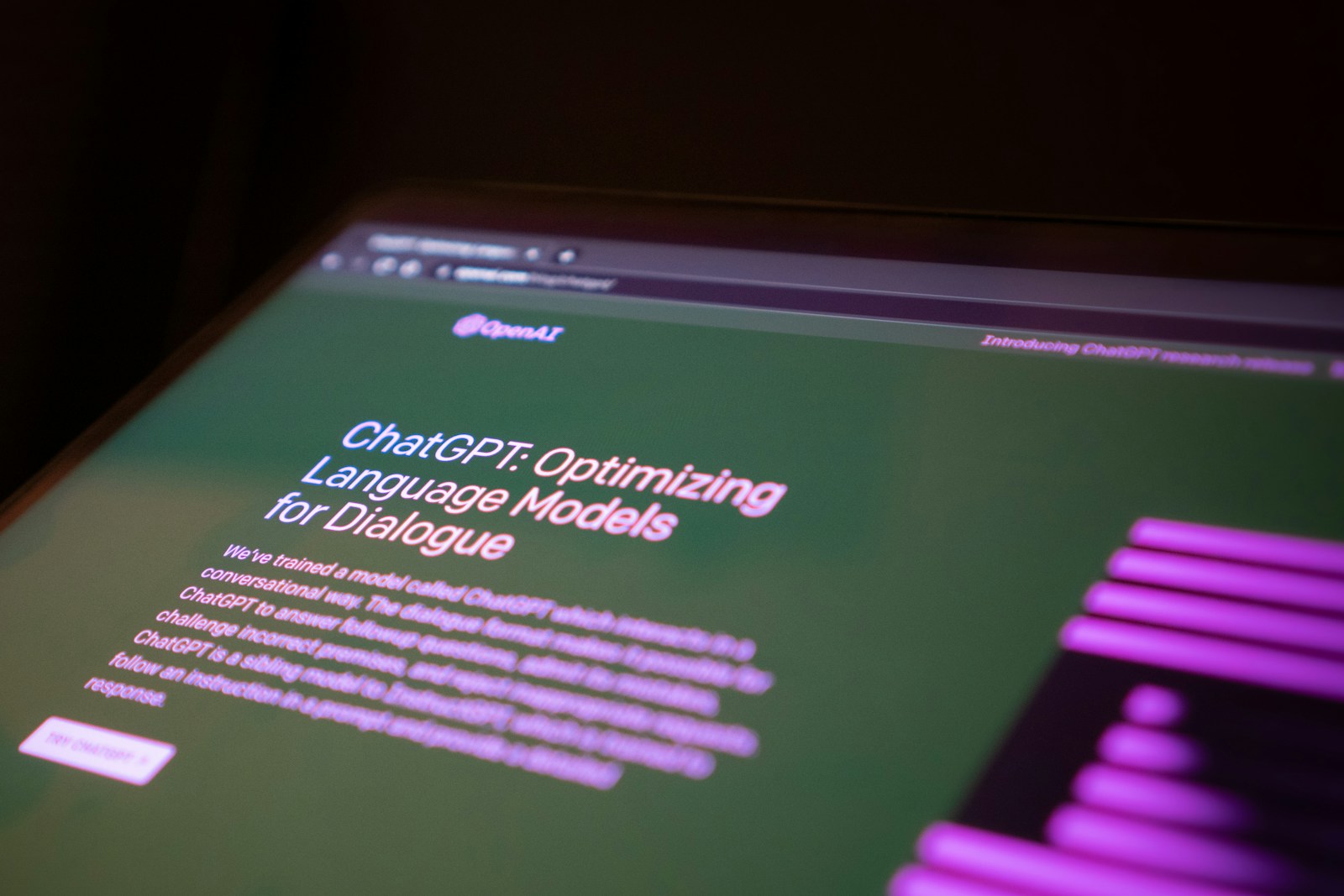
AI tools are transforming how businesses operate in 2025, offering new ways to boost productivity and streamline operations. From chatbots that handle customer service to analytics platforms that make sense of complex data, these applications are becoming essential for companies of all sizes. The right AI apps can save your business time and money while giving you a competitive edge in today’s fast-paced market.
When choosing AI tools for your business, it’s important to look beyond the hype and find solutions that address your specific needs. Many companies struggle to identify which AI applications will truly make a difference versus those that simply add technological complexity. Popular options include AI chatbots like ChatGPT for communication tasks and data analysis tools that help you make smarter business decisions.
1: ChatGPT
ChatGPT stands out as one of the most versatile AI tools for business operations today. This powerful chatbot from OpenAI can help you streamline numerous business tasks through natural language interaction.
You can use ChatGPT to draft emails, create content for your marketing campaigns, or summarize lengthy documents. Many businesses leverage it for customer service, allowing it to handle common inquiries while your team focuses on more complex issues.
The tool excels at brainstorming, giving you fresh ideas when you’re stuck on a project or marketing strategy. It can also help you analyze data and extract key insights without requiring technical expertise.
ChatGPT offers different versions, with the paid Plus version providing more advanced features and faster response times. This makes it scalable for businesses of all sizes.
What sets ChatGPT apart is its ability to understand context and learn from your interactions. The more you use it, the better it becomes at matching your business’s tone and requirements.
You can supercharge your AI use by connecting ChatGPT with various plugins designed for specific business needs. These extensions enhance its capabilities for tasks like data analysis, scheduling, and research.
While ChatGPT works well as a standalone tool, many businesses integrate it with other AI productivity tools to create comprehensive workflows that save significant time and resources.
2: Notion AI
Notion AI is designed to be an all-in-one AI tool that can transform your workspace. It helps you search your workspace, generate content, and analyze information all in one place.
What makes Notion AI special is how it can create content that matches your personal style. This helps maintain consistency across your business documents and communications.
Recent users have noticed that Notion AI gives more complete and faster responses. This improvement makes it even more valuable for busy professionals who need quick, accurate information.
You can use Notion AI to streamline your workflow in multiple ways. Some businesses integrate it with other AI apps to enhance productivity and get even more value from their Notion workspace.
The tool stands out among the best AI productivity tools in 2025 because it combines several functions that would normally require separate applications. This saves you time switching between different tools.
One of Notion AI’s biggest advantages is how it connects with your existing content. It can search through your workspace to find relevant information, making knowledge management much easier for your team.
When you need to create reports, documents, or summaries, Notion AI can generate them quickly based on your existing data. This frees up your time for more strategic work.
3: Claude 2
Claude 2 is an advanced AI assistant built by Anthropic designed to boost your business productivity. It stands out for its ability to handle complex tasks with remarkable accuracy and minimal hallucinations.
You can access Claude through the user-friendly Claude.ai platform, making it easy to integrate into your daily workflow. Many business owners consider it one of the best chat AI options available, often comparing it favorably to other leading models.
What makes Claude 2 particularly valuable for business is its exceptional document processing capabilities. You can upload lengthy documents and get accurate summaries or answers to specific questions about the content.
The system excels at content creation, helping you draft emails, reports, and marketing materials quickly. It can also assist with data analysis, customer service responses, and research.
Claude’s strength lies in understanding context and maintaining coherence across long conversations. This makes it ideal for complex business problems that require nuanced thinking.
Security is another key advantage for business users. Anthropic has designed Claude to be safe and secure, protecting your sensitive business information while you collaborate with the AI.
As you look to streamline operations in 2025, Claude 2 represents one of the top AI productivity tools worth considering for your business arsenal.
4: HubSpot CRM
HubSpot CRM has evolved beyond basic customer relationship management by integrating powerful AI capabilities across its platform. With HubSpot’s AI-powered tools, you can enhance productivity and engage customers more effectively.
The platform’s AI system, called Breeze, powers the entire customer platform. Breeze helps your customer-facing teams boost productivity and unlock insights at scale, giving you a competitive edge.
What makes HubSpot stand out is how it simplifies processes across sales, marketing, and customer support. The AI integration helps you automate repetitive tasks while maintaining a personal touch with your customers.
For small businesses, HubSpot offers particularly valuable AI tools. These features help you compete with larger companies by streamlining your processes and maximizing your team’s efficiency.
You can use HubSpot’s AI to generate content, analyze customer data, and predict sales opportunities. This allows you to make data-driven decisions without needing a dedicated analytics team.
When comparing CRM options with AI capabilities, HubSpot consistently ranks among the top platforms that have successfully integrated artificial intelligence into their core functionality.
Users across online communities have noted that HubSpot is solid for basic CRM needs, with its AI features providing additional value for businesses looking to scale their operations.
5: Zapier Automation
Zapier stands out as one of the most powerful AI productivity tools for businesses in 2025. This platform allows you to connect the apps you already use and create automated workflows without writing code.
With Zapier, you can set up “Zaps” that trigger actions across your favorite business tools. For example, when you receive an email with an attachment, Zapier can automatically save it to your cloud storage and notify your team.
The platform now features AI-powered automation that gives you even more capabilities. You can describe what you want to accomplish in plain English, and Zapier will suggest the right workflow to make it happen.
Zapier connects with over 7,000 apps, including popular business tools like Slack, Gmail, and Trello. This extensive compatibility means you can automate nearly any repetitive task your business faces.
Small businesses particularly benefit from Zapier’s time-saving capabilities. You can automate customer data collection, lead nurturing, and even parts of your sales process with AI sales assistants.
The platform offers various pricing tiers to fit businesses of all sizes. The free plan lets you try basic features, while paid plans unlock more advanced automation options and higher usage limits.
Getting started with Zapier is straightforward. Their user-friendly interface guides you through creating your first automation, and templates help you implement common workflows quickly.
6: Stack AI
Stack AI is a powerful platform designed specifically for enterprise AI needs. It offers businesses a versatile interface to deploy AI agents and build applications without extensive coding knowledge.
With Stack AI, you can create AI applications using a simple drag-and-drop system. This no-code approach makes it accessible even if your team lacks technical expertise in AI development.
The platform focuses on helping businesses automate workflows and gain valuable insights. This can be particularly beneficial if you’re looking to streamline operations and make data-driven decisions.
For startups, Stack AI provides scalable and affordable solutions that can help you compete in crowded markets. Their tools are designed to grow with your business without requiring massive initial investment.
Stack AI stands out among enterprise-grade platforms by simplifying the complex process of building and deploying AI-powered applications. This saves your team time and resources while still delivering powerful results.
You can use Stack AI to enhance multiple aspects of your business operations. From customer service automation to data analysis, the platform offers versatile applications to meet various business needs.
When considering productivity tools beyond standard options like ChatGPT or Claude, Stack AI represents a more specialized solution focused on business applications and enterprise-level implementation.
7: Midjourney
Midjourney stands out as a powerful AI image generator for your business needs. This innovative tool is focused on artistic results and can transform your marketing materials with unique visuals.
As an independent research lab, Midjourney works to expand human imagination through AI-generated imagery. You can use it to create stunning visuals for presentations, social media, or advertising campaigns.
Many businesses choose Midjourney when they need high-quality creative assets. The platform excels at generating images with artistic flair that can help your brand stand out in crowded markets.
You’ll find Midjourney consistently ranked among the best AI image generators in 2025. Its intuitive interface makes it accessible even if you lack design experience.
When comparing options for your business, remember that Midjourney specializes in artistic output rather than photorealistic images. This makes it perfect for creative marketing campaigns or product concept visualization.
Your team can use Midjourney to brainstorm visual concepts quickly without hiring external designers. This saves both time and money while maintaining high-quality outputs.
The platform continues to update its features regularly, ensuring you always have access to cutting-edge image generation technology for your business needs.
8: Grammarly
Grammarly stands out as one of the most popular AI apps among workers, helping businesses improve their communication. This powerful tool goes beyond simple grammar checking to transform how your company communicates.
When you implement Grammarly in your business, you gain access to AI writing assistance that works seamlessly across your existing workflow. The platform integrates with over 500,000 apps and websites, ensuring consistent communication throughout your organization.
Your team can benefit from Grammarly’s personalized AI guidance and text generation capabilities. These features help employees craft more effective messages, emails, and documents with less effort.
Grammarly for Business offers specialized features designed specifically for teams of all sizes. You’ll find that it boosts productivity while maintaining your company’s communication standards across departments.
The tool provides a single communication layer that follows your employees wherever they work online. This consistent presence helps maintain quality writing regardless of which platform your team uses.
Beyond basic writing improvements, Grammarly’s AI capabilities help with various business communication needs. You can rely on it to ensure your team’s writing remains professional, clear, and on-brand in all situations.
9: Zoho CRM
Zoho CRM stands out as a powerful AI-driven solution for businesses looking to enhance their customer relationship management. This platform comes with a streamlined, easy-to-use interface that helps you start selling quickly without a steep learning curve.
At the heart of Zoho CRM is Zia, their AI-powered assistant designed specifically for business tasks. Zia can help you with everything from drafting documents to pulling sales numbers, making your daily work much more efficient.
You’ll find that Zoho CRM offers excellent security features to protect your sensitive business data. The platform provides top-tier security including GDPR and HIPAA compliance, which is crucial for businesses handling customer information.
The system utilizes AI and low-code technology together, allowing you to create intelligent, data-driven solutions without extensive programming knowledge. This combination makes it accessible for teams of all technical skill levels.
For small businesses in particular, Zoho CRM delivers exceptional value. The platform scales with your company growth and offers AI features that previously were only available to enterprises with larger technology budgets.
When integrated with other Zoho applications, the CRM becomes even more powerful, creating a cohesive ecosystem for your business operations. This integration capability means you can connect your sales, marketing, and customer service efforts seamlessly.
10: Adobe Photoshop Generative Fill
Adobe Photoshop’s Generative Fill feature is a powerful AI tool that can transform your business graphics and design workflow. This tool uses Adobe Firefly AI technology to help you create and edit images with simple text prompts.
With Generative Fill, you can select an area of your image and add or remove elements based on text descriptions. This makes complex edits that once took hours now possible in seconds.
You don’t need advanced design skills to get professional results. The AI understands context and creates elements that match your existing image style and lighting.
For businesses, this means faster turnaround on marketing materials and significant cost savings. Your team can quickly create multiple versions of visuals for testing without hiring additional designers.
The tool is especially valuable for product photography. You can easily change backgrounds, add objects, or remove distractions from product shots without extensive retouching skills.
Adobe designed their AI to be commercially safe for creative professionals, addressing a major concern for business users. This means content created with Generative Fill can be used in commercial projects with confidence.
Generative Fill works alongside another powerful feature called Generative Expand, which lets you extend the canvas beyond the original image boundaries. Together, these tools give you unprecedented flexibility in image creation and editing.
To use these features, you’ll need a Creative Cloud subscription that includes Photoshop with AI capabilities. The investment quickly pays for itself through improved productivity and design quality.
Implementation Strategies
Successful AI implementation requires careful planning and a structured approach. A well-planned AI project outlines specific goals and timelines while aligning with your broader business objectives.
Integration With Existing Systems
Before implementing AI apps, conduct a thorough assessment of your current technology infrastructure. Identify potential compatibility issues that might arise when integrating new AI tools with legacy systems.
Create a phased implementation plan rather than attempting to overhaul everything at once. This approach minimizes disruption to daily operations and allows you to address issues as they emerge.
Consider using middleware solutions if direct integration proves challenging. Many modern AI tools offer APIs and pre-built connectors to simplify integration with popular business software.
Test integrations thoroughly in a controlled environment before full deployment. This helps identify potential data flow problems or performance bottlenecks that could affect your operations.
Enterprise-grade AI applications like Quickbase often provide robust integration capabilities designed specifically for complex business environments.
Staff Training and Development
Develop a comprehensive training program tailored to different roles within your organization. Not everyone needs the same level of AI expertise, but all employees should understand how the tools affect their work.
Use a mix of learning formats including hands-on workshops, video tutorials, and documentation. Different people learn in different ways, so variety improves adoption rates.
Identify and train “AI champions” within each department. These individuals can provide peer support and help troubleshoot minor issues, reducing dependency on IT or external consultants.
Consider hiring specialized talent or consultants during the initial implementation phase. Their expertise can be valuable in avoiding common pitfalls and optimizing your AI setup.
Create feedback channels where staff can report challenges or suggest improvements. This helps align your AI implementation with actual business needs rather than theoretical applications.
Security and Compliance Considerations
Implementing AI tools in your business requires careful attention to security protocols and compliance standards. Protecting sensitive data while meeting regulatory requirements ensures your AI implementation remains both effective and legally sound.
Data Protection and Privacy
When adopting AI applications for your business, data protection should be your top priority. AI systems process vast amounts of sensitive information, making them potential targets for security breaches.
Ensure your chosen AI tools offer strong encryption and data protection measures for both data in transit and at rest. Look for solutions with role-based access controls that limit who can view or modify sensitive information.
Consider implementing AI security tools that can detect and prevent unauthorized access attempts. Many modern solutions include anomaly detection capabilities that flag unusual patterns that might indicate a breach.
Regular security audits are essential. Schedule periodic reviews of your AI systems and the data they handle to identify and address vulnerabilities before they’re exploited.
Regulatory Compliance
Your AI implementations must comply with industry-specific and regional regulations governing data usage and algorithmic decision-making. Different sectors and regions have unique requirements you’ll need to navigate.
AI compliance tools can help you monitor regulatory adherence across multiple frameworks including GDPR, CCPA, HIPAA, and industry-specific guidelines. These tools provide dashboards that track compliance status and alert you to potential issues.
Conduct comprehensive AI risk assessments before deployment. These evaluations should examine potential security threats, ethical considerations, and compliance gaps.
Document your compliance efforts thoroughly. In case of audits or investigations, having clear records of your security measures and compliance activities can help demonstrate your commitment to following regulations.
Frequently Asked Questions
AI tools can dramatically boost your business efficiency and growth potential. Many solutions cater to specific business needs, from data analysis to content creation.
What are the top AI applications recommended for improving business productivity?
ChatGPT stands out as a versatile productivity tool that helps with content creation, brainstorming, and problem-solving. It can draft emails, create reports, and answer complex questions.
Notion AI enhances your workflow by summarizing documents, generating content ideas, and organizing information efficiently.
Zapier Automation connects your business apps and automates repetitive tasks between them, saving hours of manual work each week.
Which AI tools are most beneficial for small business owners?
HubSpot CRM offers powerful customer relationship management with AI features that help you track leads, automate follow-ups, and analyze customer interactions.
Small businesses can leverage Claude 2 for in-depth analysis, content creation, and answering complex business questions with nuanced responses.
Task automation tools like Zapier allow you to create workflows that run automatically, handling everything from lead collection to appointment scheduling.
Are there any high-quality AI applications available for free to businesses?
ChatGPT offers a robust free tier that businesses can use for content ideation, customer service scripts, and problem-solving scenarios.
Google’s Looker Studio provides free data visualization and analysis tools to help you understand business metrics without expensive software.
Many AI tools offer free starter plans with limited features that still provide significant value before requiring payment for advanced capabilities.
How can AI be utilized to aid business students in their academic and professional pursuits?
Business students can use ChatGPT to explain complex concepts, brainstorm project ideas, and provide feedback on assignments.
AI research assistants help summarize academic papers and business case studies, saving valuable study time and improving comprehension.
Students can practice business presentations and interviews with AI tools that provide realistic feedback and suggestions for improvement.
Which AI applications are considered industry-leading for business analytics and data management?
IBM Watson offers advanced analytics capabilities that transform raw business data into actionable insights through visual reports.
AI-powered dashboards like Google Looker Studio help you track KPIs and visualize business performance without needing technical expertise.
Predictive analytics tools can forecast sales trends, identify potential market shifts, and help you make data-driven business decisions.
What AI solutions are recommended for self-employed individuals to enhance their business operations?
Self-employed professionals benefit from using ChatGPT to handle content creation, customer communications, and administrative tasks without hiring additional help.
Notion AI helps solopreneurs organize projects, take smart notes, and create content while maintaining a professional presence.
Automated bookkeeping and invoicing tools with AI capabilities reduce financial management time and help track business expenses accurately.






